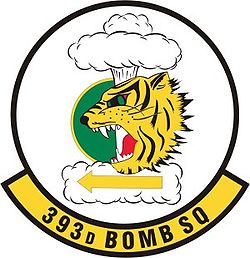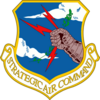393rd Bomb Squadron
This article includes a list of references, related reading, or external links, but its sources remain unclear because it lacks inline citations. (December 2012) |
| 393d Bomb Squadron | |
|---|---|
 393d Bomb Squadron Patch | |
| Active | 11 March 1944–30 September 1990 27 August 1993–present |
| Country | United States |
| Branch | United States Air Force |
| Type | Strategic Bombing |
| Part of | Air Force Global Strike Command 8th Air Force 509th Bomb Wing 509th Operations Group |
| Garrison/HQ | Whiteman Air Force Base |
| Engagements | World War II Vietnam War Operation Crossroads |
| Decorations | |

The 393d Bomb Squadron (393 BS) is part of the 509th Bomb Wing at Whiteman Air Force Base, Missouri.
The 393d Bombardment Squadron is the only United States Air Force squadron to carry out a nuclear attack on an enemy in combat. During World War II, its aircraft attacked Hiroshima on 6 August 1945 and Nagasaki, Japan 9 August 1945 with atomic bombs.
Mission
It operates B-2 Spirit aircraft providing strategic bombing capability.
History
Activated as a B-29 Superfortress squadron in early 1944; trained under Second Air Force. Due to a shortage of B-29s, the squadron was initially equipped with former II Bomber Command B-17 Flying Fortresses previously used for training heavy bomber replacement personnel as engineering flaws were being worked out of the B-29.. The squadron was then reassigned for advanced training and received B-29s at Fairmont Army Airfield, Nebraska during the late spring and summer of 1944.
509th Composite Group
In December 1944 reassigned as the only operational B-29 squadron to 509th Composite Group at Wendover Field, Utah in December. Aircraft were refitted to Silverplate configuration becoming atomic bomb capable under a highly classified program. Deployed to North Field, Tinian in late May 1945, flying non-combat missions practicing atomic bomb delivery techniques. The squadron carried out two Atomic Bombing missions over Japan in August 1945, being the only squadron in the world to ever carry out and deliver nuclear weapons in combat. Dropped the first atomic bomb on Hiroshima, Japan, on 6 August 1945, and the second atomic bomb on Nagasaki, Japan, on 9 August 1945.
Reassigned to the United States in November 1945, becoming part of Continental Air Forces, later Strategic Air Command. Deployed to Kwajalein in 1946 to carry out Operation Crossroads atomic bomb tests on Bikini Atoll in July.
Strategic Air Command
Began upgrading to the new B-50 Superfortress, an advanced version of the B-29 in 1949. The B-50 gave the unit the capability to carry heavy loads of conventional weapons faster and farther as well as being designed for atomic bomb missions if necessary. Squadron deployed to SAC airfields in England, and also to Andersen AFB, Guam on long-term deployments in the 1950s.
By 1951, the emergence of the Soviet Mig-15 interceptor in the skies of North Korea signaled the end of the propeller-driven B-50 as a first-line strategic bomber. Received new, swept wing B-47 Stratojets in 1955 which were designed to carry nuclear weapons and to penetrate Soviet air defenses with its high operational ceiling and near supersonic speed. The squadron flew the B-47 for about a decade when by the mid-1960s it had become obsolescent and vulnerable to new Soviet air defenses. The squadron began to send its stratojets to AMARC at Davis-Monthan AFB for retirement in 1965.
Was scheduled for inactivation however instead received B-52D Stratofortresses in 1965. It rotated aircraft and crews to Andersen Air Force Base, Guam, in support of Southeast Asia Arc Light Operations between 1966 and 1969. Not operational, Nov 1969–Jun 1971. Re-equipped with FB-111 nuclear capable medium bomber in 1970; operated until retirement in 1990.
Modern era
Reactivated in 1993 as first operational B-2 Spirit stealth bomber squadron.
Operations and Decorations
- Combat Operations: Combat in Western Pacific, 1 Jul-14 Aug 1945. Only squadron trained for atomic warfare in World War II Participated in atomic bomb tests on Bikini Atoll, Jul 1946, while deployed on Kwajalein. Rotated aircraft and crews to Andersen AFB, Guam, in support of Southeast Asia Operations, 1966-1969.
- Campaigns: World War II: Air Offensive, Japan; Eastern Mandates; Western Pacific. Vietnam War; Global War on Terrorism.
- Decorations: Air Force Outstanding Unit Awards: Apr-1 Oct 1968; 1 Jul 1977-30 Jun 1979; 1 Jul 1981-30 Jun 1982; 1 Jul 1982-30 Jun 1984; 1 Jul 1988-30 Jun 1990. Republic of Vietnam Gallantry Cross with Palm: 5 Mar-14 Oct 1969.
Lineage
- Constituted 393d Bombardment Squadron, Very Heavy, on 28 Feb 1944
- Activated on 11 Mar 1944
- Redesignated: 393d Bombardment Squadron, Medium, on 2 Jul 1948
- Redesignated: 393d Bombardment Squadron, Heavy, on 2 Apr 1966
- Redesignated: 393d Bombardment Squadron, Medium, on 1 Dec 1969
- Inactivated on 30 Sept 1990
- Redesignated 393d Bomb Squadron on 12 Mar 1993
- Activated on 27 Aug 1993
- Operates as provisional 393d Expeditionary Bomb Squadron when aircraft/personnel/equipment deployed to combat zones as part of the Global War on Terrorism
Assignments
- 504th Bombardment Group, 11 Mar 1944
- Second Air Force, 25 Nov 1944
- 509th Composite (later, 509th Bombardment) Group, 17 Dec 1944
- Attached to 509th Bombardment Wing, 17 Nov 1947-14 Sept 1948 and 1 Feb 1951-15 Jun 1952
- 509th Bombardment Wing, 16 Jun 1952-30 Sept 1990
- Probably attached to Twentieth Air Force, 18 Jun-c. 18 Sept 1953
- 509th Operations Group, 27 Aug 1993–Present
- Attached to: United States Air Forces Central when deployed to combat zones as part of the Global War on Terrorism after 11 September 2001.
Stations
- Dalhart Army Air Field, Texas, 11 Mar 1944
- Fairmont Army Airfield, Nebraska, 12 Mar 1944
- Wendover Field, Utah, 14 Sep 1944-26 Apr 1945
- North Field, Tinian, 30 May-17 Oct 1945
- Roswell AAFld (later, Walker AFB), New Mexico, 6 Nov 1945
- Deployed at: Bucholz Army Airfield, Kwajalein, Marshall Islands, 1 May-Jul 1946
- Deployed at: RAF Mildenhall, England, 4 Jun-2 Sept 1952
- Deployed at: Andersen AFB, Guam, 18 Jun-c. 18 Sept 1953 and 10 Jul-8 Oct 1954
- Deployed at: RAF Upper Heyford, England, 26 Jan-30 Apr 1956
- Pease AFB, New Hampshire, 1 Jul 1958-30 Sept 1990
- Whiteman AFB, Missouri, 27 Aug 1993–present
- Undetermined Locations when deployed to combat zones as part of the Global War on Terrorism after 11 September 2001.
Aircraft
|
|
See also
References
![]() This article incorporates public domain material from the Air Force Historical Research Agency
This article incorporates public domain material from the Air Force Historical Research Agency





